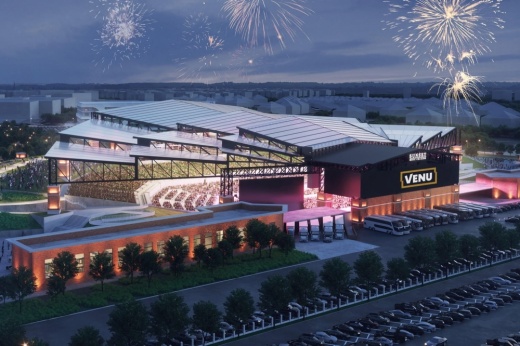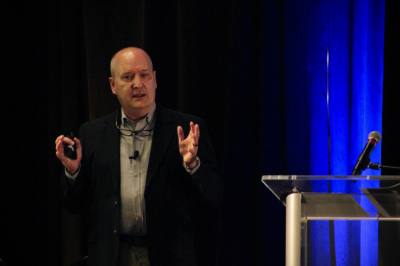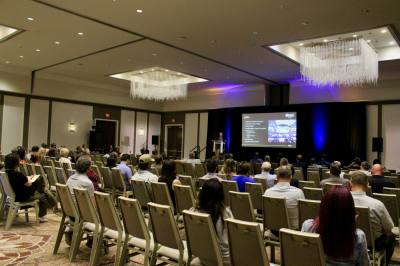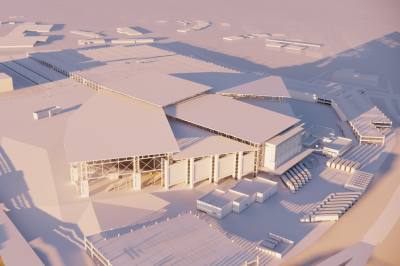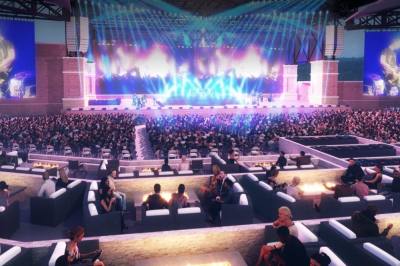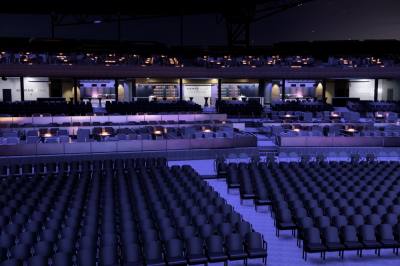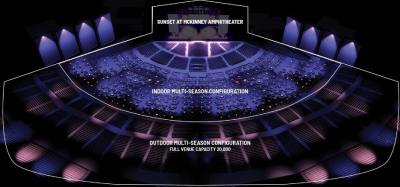Representatives from Venu, the Colorado-based company developing the project, spoke to community members at an April 22 public meeting, providing an update on the project and offering a chance to attendees to ask questions. The project, which will bring a 20,000-seat entertainment venue to the city, is set to be completed by summer 2026.
The gist
The 20,000-seat entertainment venue, which was announced in March 2024, will be located on a 46-acre tract of land at the northeast corner of US 75 and SH 121, near the Sheraton McKinney.
The “ultra-lux” $300 million venue will feature 295 fire pit suites for purchase as well as the exclusive Aikman Club, a private membership-based club in partnership with Troy Aikman, an NFL Hall of Famer and founder of Eight Elite Light Beer. The site will also contain 5,100 onsite parking spaces in a multi-level parking structue.
The project is being developed as part of a public-private partnership between Venu, the city of McKinney, the McKinney Community Development Corporation and the McKinney Economic Development Corporation. The partnership agreement included the sale of the land, previously owned by MEDC, as well as over $50 million in incentives, city documents state.
The site plan was approved in November 2024, the land purchase was finalized in January and construction on the site began in April, a company news release states. The project is expected to spur more than $3 billion in economic impact during its first 10 years of operations in addition to jobs added and tax revenues generated, the release states.
The update
About 75 people attended the April 22 meeting, said Chloe Hoeft, the vice president of relations and philanthropy for Venu. The event included a presentation by Bob Mudd, Venu’s vice president of real estate development, followed by a question and answer session.
Mudd detailed the project plan, including a proposed addition that would place additional sound walls on either side of the stage. The walls have not yet been approved by city officials but would have a “dramatic impact” on the amount of sound that leaves the venue, Mudd said.
Mudd also noted that the venue, which was previously planned to have a grass berm as part of the seating plan will now feature fixed seating throughout.
“This is a project that's being presented to you today that looks quite different than what it did the day that we started,” Mudd said.
Venu officials announced in February the open-air facility will also be configured to accommodate year-round operation through implementing radiant heating technology, a change from the initial plan to limit shows to a more limited touring season. The venue’s configuration will also allow for events of various sizes, Mudd said, including smaller events with about 5,000 attendees and medium-sized events with 14,000 attendees in addition to events that fill the 20,000-seat venue.
The venue, which will host 70 shows annually featuring major touring artists, will also be made available for community events such as high school performances and conferences, Mudd said.
Diving in deeper
Questions asked by community members at the public meeting centered around impacts to the surrounding area, including noise and traffic.
In addition to the proposed sound walls, other sound control measures factored into the project plan include enclosing the stage, using directional speakers and locating both the planned parking structures and a 3-story sound wall between the venue and the nearest residences.
The traffic study for the project is still being finalized, according to the city’s website, but Mudd said that project officials expect road work to support the project will include improvements to 11 adjacent intersections. He also noted that regional entities including the Regional Transportation Council are assessing potential improvements to adjacent highways SH 121 and US 75.
A Distributed Antenna System, or DAS, will also be installed at the venue, Mudd said. The technology will enhance cellular service in the area and compensate for increased demand for cellular service at the location during events. Mudd said the technology would likely improve cellular service capacity in the area when the venue is not being used.
“Many of the commitments that we've made in partnership with the city make the site suitable and integrated with the local community,” Mudd said.
Quote of note
“Watching this project come to life is truly special,” Venu Founder and CEO J.W. Roth said in the release. “This is our biggest and most luxurious development yet, and we’re so proud to bring it to this community as we elevate McKinney to the epicenter of live music in Texas. We’re not just turning dirt—we’re turning heads as we kick off this remarkable journey together.”
Looking ahead
A private, ceremonial groundbreaking event is scheduled for June 13, the release states. Construction on the project is expected to take between 14 and 16 months, Mudd said, with an estimated completion set for summer 2026.
Project officials are required to announce the operator for the venue by Sept. 15 following an amendment to the Chapter 380, grant and development agreement in late 2024.
For more information on the project, visit www.venu.live/venues/mckinney.




